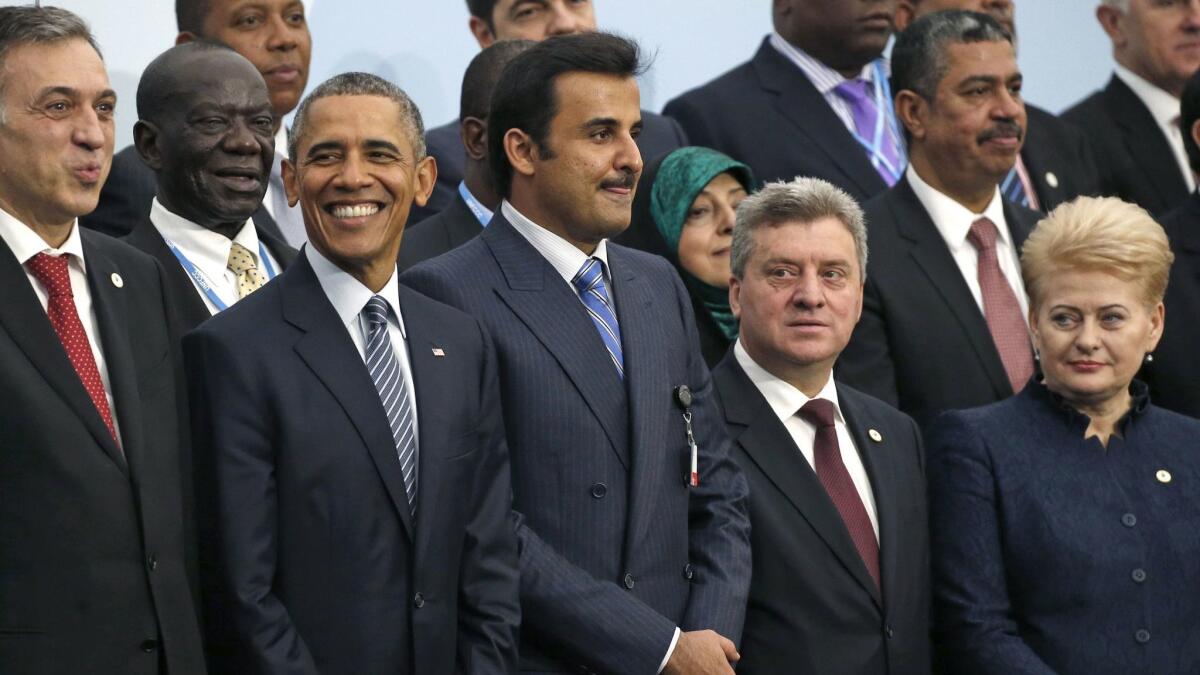Op-Ed: The Paris agreement got the logic of climate action all wrong. Good riddance

- Share via
The Paris accord’s fate was sealed a year prior to its negotiation, at the little-noticed Lima climate conference of 2014. There, diplomats abandoned their decades-long pursuit of a binding agreement that would commit the world to substantial reductions in greenhouse-gas emissions. A new process of “pledge and review,” they determined, would govern future talks.
Under this process, each country would submit an “Intended Nationally Determined Contribution,” or INDC, and the sum of those pledges would constitute the “agreement.” No standards would govern these INDCs, which could promise great achievements or nothing at all. Countries could modify these INDCs at will. There would be no consequences for falling short.
Thus, when negotiators reached Paris in December 2015, there was surprisingly little to talk about — and certainly no question whether an “agreement” would be reached. Almost every country had submitted something, and the delegates lacked standing to scrutinize or challenge those submissions; haggling centered on details of the requirement that everyone return each year and evaluate progress.
Its breakthrough was not in lifting nations up to higher levels of ambition, but rather in dropping expectations to the lowest common denominator.
The theory behind “pledge and review” was that participants would each want to act provided all others acted too, and that peer pressure would lead to stronger pledges over time. But that logic relied on a misunderstanding of what motivates developing nations. Their rapidly rising energy consumption will account for an overwhelming majority of greenhouse-gas emissions this century. They are pursuing economic growth as rapidly as possible, and in most cases, fossil-fuel infrastructure remains the cheapest and easiest source of energy for such growth.
Significantly altering these nations’ emissions trajectories requires that they slow their growth. Arguments that renewable energy already makes economic sense are beside the point; where that is the case, nations will adopt them without international treaties. The premise of a negotiated agreement is to adopt policies that do conflict with economic imperatives for the sake of emissions cuts. Understandably, developing nations whose populations do not yet have access to reliable energy find this trade-off unappealing, regardless of whether the United States and Europe take bold action or ignore the climate problem.
This direct tension between expanding energy access and reducing emissions, unavoidable given the constraints of current technology, always has been central to climate policy — and to the failure of efforts at international cooperation. But Paris did not solve this problem; it simply ignored it by abandoning the expectation of substantive commitments.
Its breakthrough was not in lifting nations up to higher levels of ambition, but rather in dropping expectations to the lowest common denominator.
What about peer pressure? Developing nations submitted uniformly meaningless commitments. China promised to reach peak emission around 2030, right when it was expected to anyway. India made no emissions commitment but pledged to improve its energy efficiency, less quickly than it already was improving. Many countries offered no meaningful baseline for comparison. Pakistan only “committed to reduce its emissions after reaching peak levels to the extent possible.” Yet no one complained.
To the contrary, the United States and the EU, U.N. leaders, climate activists and commentators all bent over backward to emphasize this unprecedented success in bringing the world together. Rather than face criticism for pledges to do nothing, countries received applause. A refusal to take climate action seriously earned the activists’ seal of approval. Getting the deal, any deal, became the entire point.
This expediency had several disastrous consequences. First, it left the world committed to a global climate accord that did not address climate change. Analysis at the Massachusetts Institute of Technology indicated that full compliance with all pledges would reduce temperatures in the year 2100 by only 0.2 degrees Celsius, and even that may have been generous.
Second, it left the United States exposed. When nations reassembled each year to review commitments, what would they find? Those that had submitted the weakest pledges would appear to be on track or even ahead. But President Obama had promised progress from the American people beyond what even his own policies likely would bring about.
We would be the ones making real efforts and incurring real costs, yet we would be the ones chastised for failing to deliver.
This dynamic is already playing out. Pundits are lauding China for achieving peak emissions far sooner than they pledged, without interrogating whether this says more about the country’s progress or its pledge. Meanwhile, EU leaders look down their noses at the United States, even as their emissions rise and U.S. emissions fall.
Why would the United States remain party to such an agreement? We shouldn’t have accepted its terms in the first place, and in an important sense, we didn’t. The U.S. Constitution requires the Senate to approve any treaty by a two-thirds supermajority, in part to prevent a president from making rash, politically motivated promises on the international stage that lack consensus support back home. Obama, knowing he did not have the Senate’s consent, chose to push ahead anyway. If reversing that mistake enrages some foreign diplomats, they have only themselves and their former negotiating partners in the Obama administration to blame.
Oren Cass is a senior fellow at the Manhattan Institute.
Follow the Opinion section on Twitter @latimesopinion or Facebook
More to Read
A cure for the common opinion
Get thought-provoking perspectives with our weekly newsletter.
You may occasionally receive promotional content from the Los Angeles Times.






